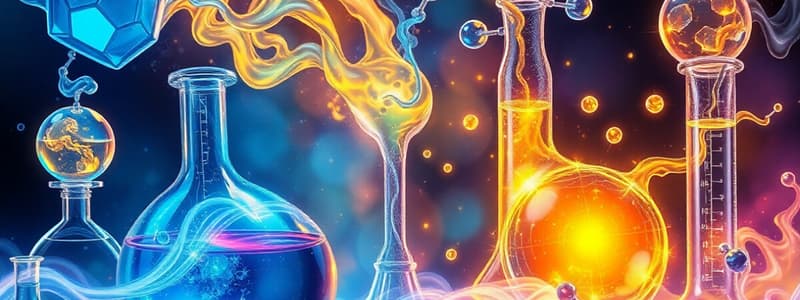Podcast
Questions and Answers
What is the general form of a synthesis reaction?
What is the general form of a synthesis reaction?
- A + B → AB (correct)
- AB → A + B
- AB + CD → AD + CB
- A + BC → AC + B
In which type of reaction does an acid react with a base?
In which type of reaction does an acid react with a base?
- Single Replacement Reaction
- Redox Reaction
- Precipitation Reaction
- Acid-Base Reaction (correct)
Which reaction type typically involves the transfer of electrons?
Which reaction type typically involves the transfer of electrons?
- Decomposition Reaction
- Redox Reaction (correct)
- Combustion Reaction
- Complex Formation Reaction
What kind of reaction results in an insoluble solid forming from two solutions?
What kind of reaction results in an insoluble solid forming from two solutions?
Which of the following is an example of a combustion reaction?
Which of the following is an example of a combustion reaction?
Flashcards are hidden until you start studying
Study Notes
Reaction Types
-
Synthesis Reactions
- Two or more reactants combine to form a single product.
- General form: A + B → AB
- Example: 2H₂ + O₂ → 2H₂O
-
Decomposition Reactions
- A single compound breaks down into two or more simpler substances.
- General form: AB → A + B
- Example: 2H₂O → 2H₂ + O₂
-
Single Replacement Reactions
- An element replaces another element in a compound.
- General form: A + BC → AC + B
- Example: Zn + 2HCl → ZnCl₂ + H₂
-
Double Replacement Reactions
- The ions of two compounds exchange places in aqueous solution.
- General form: AB + CD → AD + CB
- Example: AgNO₃ + NaCl → AgCl + NaNO₃
-
Combustion Reactions
- A substance combines with oxygen, releasing energy in the form of light and heat.
- Generally involves hydrocarbons reacting with oxygen to produce CO₂ and H₂O.
- Example: CH₄ + 2O₂ → CO₂ + 2H₂O
-
Redox Reactions (Oxidation-Reduction)
- Involves the transfer of electrons between substances.
- Oxidation: Loss of electrons; Reduction: Gain of electrons.
- Example: 2Fe + 3Cl₂ → 2FeCl₃ (Fe is oxidized; Cl is reduced)
-
Acid-Base Reactions
- An acid reacts with a base to produce salt and water.
- General form: Acid + Base → Salt + Water
- Example: HCl + NaOH → NaCl + H₂O
-
Precipitation Reactions
- Two solutions react to form an insoluble solid (precipitate).
- Example: BaCl₂ + Na₂SO₄ → BaSO₄ (s) + 2NaCl
-
Complex Formation Reactions
- A complex ion is formed when a metal ion binds to one or more ligands.
- Example: Ag⁺ + 2NH₃ → [Ag(NH₃)₂]⁺
Key Points
- Each reaction type has distinct characteristics and outcomes.
- Reaction types can often be identified by the changes in reactants and products.
- Understanding reaction types is critical for predicting products and balancing equations.
Reaction Types
-
Synthesis Reactions: Multiple reactants combine to form one product.
- General form: A + B → AB
- Example: Hydrogen and oxygen forming water: 2H₂ + O₂ → 2H₂O.
-
Decomposition Reactions: A single compound breaks down into simpler substances.
- General form: AB → A + B
- Example: Water separating into hydrogen and oxygen: 2H₂O → 2H₂ + O₂.
-
Single Replacement Reactions: An element replaces another in a compound.
- General form: A + BC → AC + B
- Example: Zinc displacing hydrogen in hydrochloric acid: Zn + 2HCl → ZnCl₂ + H₂.
-
Double Replacement Reactions: Ions from two compounds exchange places in an aqueous solution.
- General form: AB + CD → AD + CB
- Example: Silver nitrate reacting with sodium chloride: AgNO₃ + NaCl → AgCl + NaNO₃.
-
Combustion Reactions: A substance reacts with oxygen, releasing energy, typically in the form of heat and light.
- Often involves hydrocarbons producing carbon dioxide and water.
- Example: Methane burning in oxygen: CH₄ + 2O₂ → CO₂ + 2H₂O.
-
Redox Reactions (Oxidation-Reduction): Involves electron transfer between substances.
- Oxidation refers to loss of electrons; reduction refers to gain of electrons.
- Example: Iron reacting with chlorine: 2Fe + 3Cl₂ → 2FeCl₃ (where iron is oxidized and chlorine is reduced).
-
Acid-Base Reactions: An acid reacts with a base to form salt and water.
- General form: Acid + Base → Salt + Water
- Example: Hydrochloric acid reacting with sodium hydroxide: HCl + NaOH → NaCl + H₂O.
-
Precipitation Reactions: Two solutions combine to create an insoluble solid known as a precipitate.
- Example: Barium chloride reacting with sodium sulfate: BaCl₂ + Na₂SO₄ → BaSO₄ (s) + 2NaCl.
-
Complex Formation Reactions: A complex ion forms when a metal ion bonds with ligands.
- Example: Silver ion binding with ammonia: Ag⁺ + 2NH₃ → [Ag(NH₃)₂]⁺.
Key Points
- Each reaction type exhibits unique characteristics and products.
- Reaction types are identified by observing changes in reactants and products.
- Understanding these types is essential for predicting chemical behavior and balancing equations.
Studying That Suits You
Use AI to generate personalized quizzes and flashcards to suit your learning preferences.




